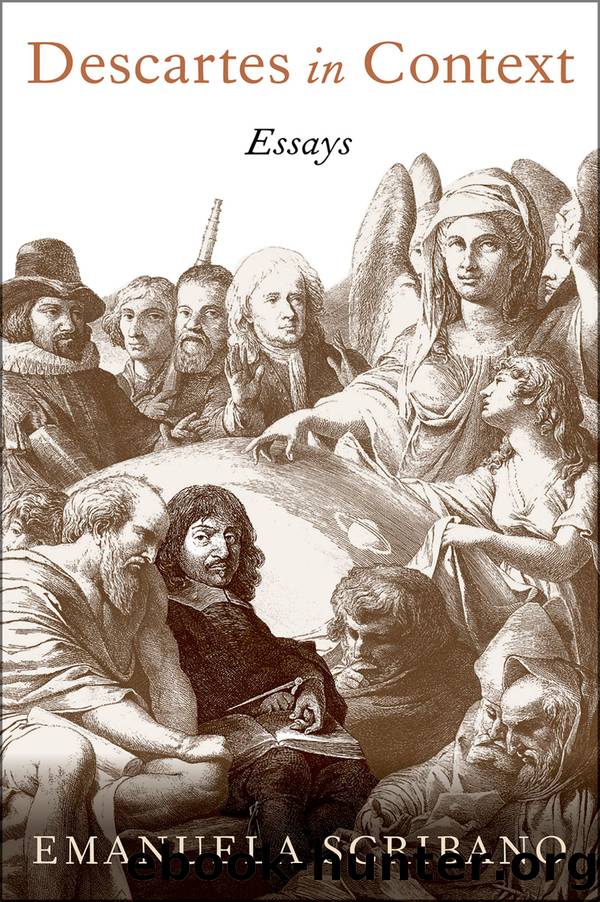Descartes in Context by Emanuela Scribano;

Author:Emanuela Scribano;
Language: eng
Format: epub
Publisher: Oxford University Press USA
Published: 2022-06-15T00:00:00+00:00
4. A Physiological Doubt
The heuristic value that the Optics and the letter to Froidmond ascribe to madness, dreams, and the phantom limb is also what explains why these states actually represent such formidable reasons for Cartesian doubt. The impossibility of distinguishing dreams, madness, and a phantom limb from normal perception is ultimately justified by what physiology has shown, namely that the cause of these altered or even pathological conditions is precisely the standard mechanism of perception and not some perversion of it.
At the end of the Sixth Meditation, Descartes disposes of the arguments that had questioned the existence of material things in the First Meditation. He keeps quiet about madness and provides the doubt regarding dreams with a solution that is as cursory as it is unsatisfactory: without too much effort, everyone can distinguish dreams, which are inconsistent and fragmentary, from reality (AT VII: 89â90; CSM II: 61â62). So, was the doubt regarding dreams evoked in the First Meditation just a game that no sensible reader could be expected to take seriously? Yet, as we have seen, the Optics mentioned dreaming (âthose who are asleepâ) and madness (âmadmenâ) to demonstrate that sense perception provides no certainty that the external world exists. Dream and madness offered the quintessential confirmation of Cartesian physiological theory by demonstrating how, in sense perception, the only certainty is that the brain exists, just as in the case of the phantom limb mentioned for the same purpose in the letter to Froidmond.
In the First Meditation we did not know anything about the new science, but now this science has made an authoritative irruption. Is it possible that dream and madness do not return to offering a valid scientific objection to the natural propensity to believe that external bodies exist, as the phantom limb had for the existence of oneâs own body? Is it possible that dream and madness remain excluded from the reasons for the doubt that I will call âphysiologicalâ? The fact that dreaming, madness, and phantom limbs have been used as paradigms to understand normality blurs or even erases the distinction between these conditions and normality. Thus, madness is not so much a trivial episode, as Derrida objected to Foucault, as a condition indiscernible from normality.8
All the Cartesians who were originally attracted to Descartesâ philosophy more on account of his physiology than of his metaphysics agreed on the impossibility of making sure that the external world exists via our perceptions. As is well known, Cordemoy relied on faith and was followed by Malebranche. However, the first to rely on faith was Henricus Regius, who was also the closest to Descartes in the field of physiology. The second edition of his Philosophia naturalis begins with the same claim that Cordemoy and Malebranche later repeat: the existence of external bodies is merely plausible, and only faith can make it sure:
Download
This site does not store any files on its server. We only index and link to content provided by other sites. Please contact the content providers to delete copyright contents if any and email us, we'll remove relevant links or contents immediately.
| Deconstruction | Existentialism |
| Humanism | Phenomenology |
| Pragmatism | Rationalism |
| Structuralism | Transcendentalism |
| Utilitarianism |
The remains of the day by Kazuo Ishiguro(8999)
Tools of Titans by Timothy Ferriss(8396)
Giovanni's Room by James Baldwin(7346)
The Black Swan by Nassim Nicholas Taleb(7129)
Inner Engineering: A Yogi's Guide to Joy by Sadhguru(6796)
The Way of Zen by Alan W. Watts(6614)
The Power of Now: A Guide to Spiritual Enlightenment by Eckhart Tolle(5782)
Asking the Right Questions: A Guide to Critical Thinking by M. Neil Browne & Stuart M. Keeley(5775)
The Six Wives Of Henry VIII (WOMEN IN HISTORY) by Fraser Antonia(5515)
Astrophysics for People in a Hurry by Neil DeGrasse Tyson(5190)
Housekeeping by Marilynne Robinson(4447)
12 Rules for Life by Jordan B. Peterson(4304)
Ikigai by Héctor García & Francesc Miralles(4274)
Double Down (Diary of a Wimpy Kid Book 11) by Jeff Kinney(4272)
The Ethical Slut by Janet W. Hardy(4253)
Skin in the Game by Nassim Nicholas Taleb(4249)
The Art of Happiness by The Dalai Lama(4130)
Skin in the Game: Hidden Asymmetries in Daily Life by Nassim Nicholas Taleb(4007)
Walking by Henry David Thoreau(3962)
